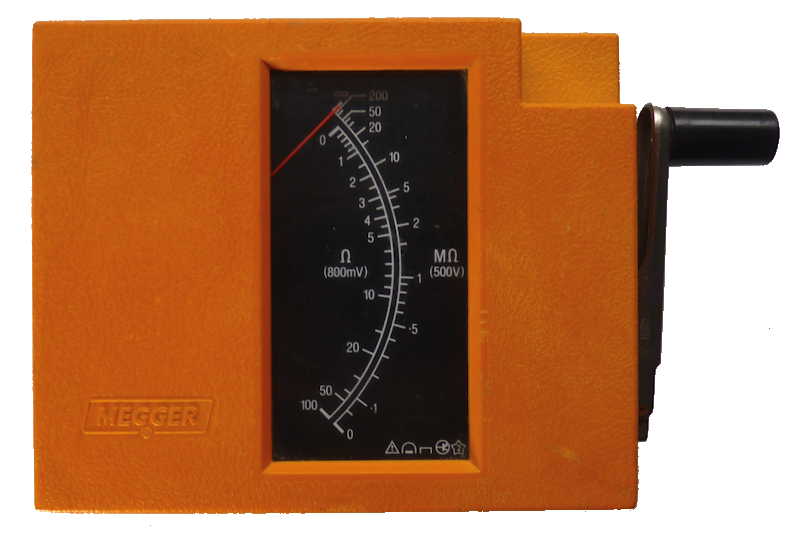
ser no 1039M90925
The series 3 version or 'Wee Megger' was discontinued sometime after
the late
1960s to be replaced by the WM4 WM5 and WM6 all of which are powered by
an AC generator and include a
continuity range. The WM is understood to refer to Wee Megger.
The BM range of Battery Meggers were also made.
The WM5 is a completely self contained instrument designed to give
rapid and accurate measurement of insulation resistance and continuity
resistance. It uses a low voltage hand-cranked a.c. brushless generator
as the power supply. The generator is easy to turn and is connected to
a rectifier and d.c. to d.c. converter to provide the test voltages.
Two sockets are provided in the side of the case for the test leads and
a slider switch selects either insulation or continuity tests (‘MΩ’ or
‘Ω’). The case is robust, made of ABS plastic, and the generator handle
folds away as in all previous models when not in use.
Unlike previous models the moving coil meter has a taut band suspension, white markings on a black scale plate and an orange ‘dayglow’ pointer. The scale plate is calibrated 0 to 200 MΩ and 0 to 100Ω with mid scale values of about 1MΩ and 8Ω with voltages of 500V and 800mV repectively.

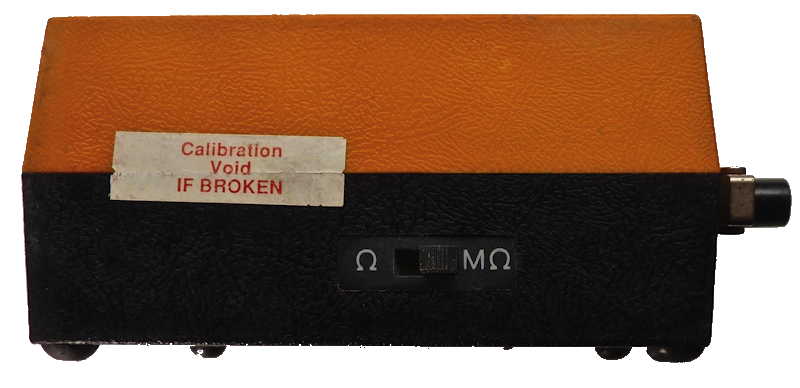
Test leads sockets and protective fuse holder on end and Ω-MΩ slide switch on side
(Fuse
1A ceramic 20 x 5 mm)
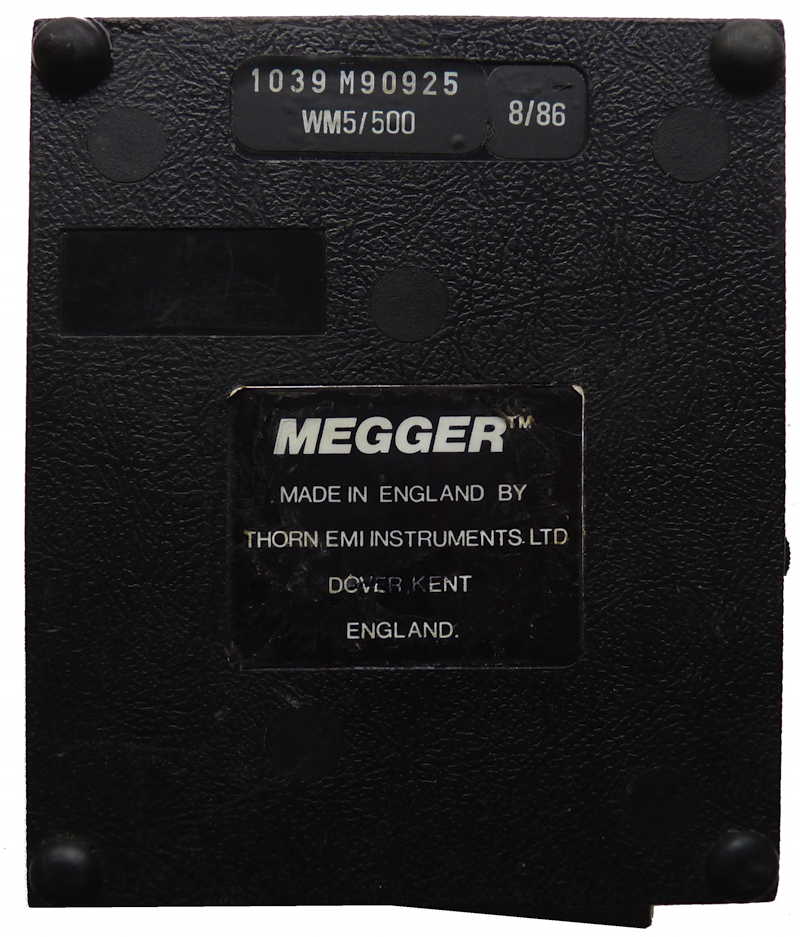
underside
showing serial number and date code 8/86 (August 1986)
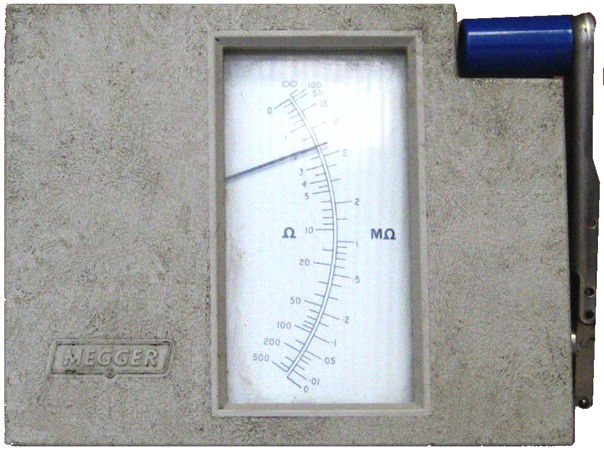
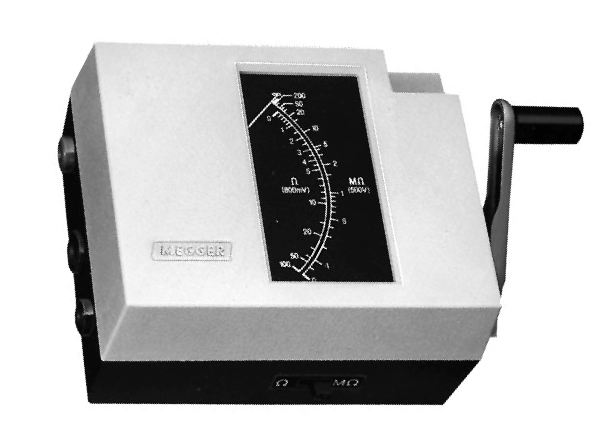
The WM4 and WM6 are of similar design
I haven't found any information about the
WM4 or WM5 models but have found information about the WM6 which you
can view here and here. The WM4 models have 0
to 100 MΩ and 0 to 50Ω scales.
Early models were made and presumably designed by Evershed and Vignoles
(as part of Thorn EMI) before manufacturing continued at the AVO works
in Dover.
Warning!
NEVER TOUCH THE TEST LEADS WHILE THE MEGGER IS BEING USED and
make sure that the item you are checking is de-energised, discharged
and
isolated before using the megger. Normal insulations should read
infinity. Any small resistance reading indicates the insulation is
breaking down. The circuit or item you are testing may have
considerable capacitance and retain an electrical charge after testing.
After you make your connections, apply the test voltage until a steady
reading is obtained.
The insulation resistance reading
should drop or remain relatively steady. This is because electrical
insulation materials exhibit capacitance and will charge up during the
course of the test.
What affects insulation
resistance
readings?
Apart from dirt and damp insulation resistance is temperature-sensitive. When temperature increases, insulation resistance decreases, and vice versa. A common rule of thumb is insulation resistance changes by a factor of two for each 10 degree C change. So, to compare new readings with previous ones, you'll have to correct your readings to some base temperature. For example, suppose you measured 100 megohms with an insulation temperature of 30C. A corrected measurement at 20C would be 200 megohms (100 megohms times two). It is also worth bearing in mind that as time goes by the quality of insulating materials gradually deteriorates (especially at elevated temperatures)
Other insulation testers work on the same principle though the voltage required may be obtained from a battery operated inverter or a motor driven generator see this example. For more information on Evershed and Vignoles early insulation testing equipment see: here.
Evershed & Vignoles Ltd of Acton Lane Works,Chiswick were taken over by AVO Ltd. Avocet House, 92-96 Vauxhall Bridge Road, London, SW1. AVO was a member of the Metal Industries Group of companies. Though known for their Avometer general purpose multimeter, they made a wide range of test gear including valve testers. The Acton Lane works closed down at about that time - around 1986. The current range of products can be seen at: https://uk.megger.com
The firm Megger Ltd is based at: Archcliffe Road, Dover, Kent, CT17 9EN, United Kingdom.
For hand driven generators, Meggers and other insulation testers click here

